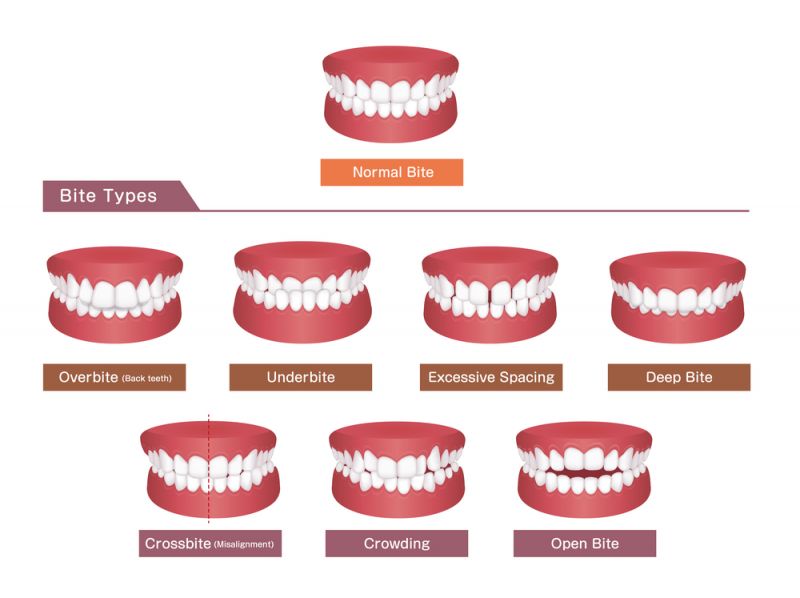Common Orthodontic Issues
Dr. Tun Treats All Occlusal and Orthodontic Conditions
The relationship between teeth, side-by-side and upper-to-lower, impacts how the mouth functions, as well as esthetics. Likewise, the size of jaws and teeth, and the number and alignment of teeth, affect both function and estheitcs. While cosmetic issues may not cause oral health concerns, functional issues can contribute to significant damage if left untreated.
These documents from the American Orthodontic Association further describe how to identify common orthodontic issues in adults and children.
About Occlusion
Occlusion is defined as how opposing teeth on the upper and lower arches fit together when the mouth is shut. Malocclusion occurs when the fit is not balanced and healthy.
Additionally, malocclusion contributes to teeth breakage (chips, cracks/fractures) and crazing (weblike surface cracks). TMJ disorder, caused by an imbalance of the jaw joints, may develop due to malocclusion. This condition creates pain ranging from mild to acute and may be corrected, in some cases, with orthodontic therapy.
These are the most common orthodontic issues Dr. Tun treats at Harmony Orthodontics in Tomball:

Crowding

Crowding occurs when teeth have insufficient space in the upper, lower, or both arches. Teeth force their way in, overlapping and twisting. Malocclusion may develop with crowding. Furthermore, patients have difficulty thoroughly cleaning crowded teeth. When plaque, tartar, and food particles aren’t completely removed by brushing and flossing, harmful bacteria build. This often leads to dental decay and gingivitis (gum disease).
Deep Overbite

Also called “deep bite,” overbite presents as upper teeth protruding beyond lower teeth. Patients may genetically inherit an open bite due to malformation of the jaw: underdeveloped lower jaw, overdeveloped upper jaw, or both. Also, thumbsucking, prolonged use of a pacifier or bottle, tongue thrusting, or habitually chewing on objects may cause an open bite. In some cases, children’s bites naturally normalize after the cessation of these practices. However, an open bite may require orthodontic therapy.
Overjet

Similar to an overbite, overjet refers to a malocclusion issue. Patients may inherit the condition from parents, but oftentimes thumbsucking, prolonged pacifier use or bottle feeding, or tongue thrusting cause the development of an overjet. If an overjet does not naturally resolve during early childhood, braces may be advised.
Upper Front Teeth Protrusion

The family dentist or parents may notice upper front teeth protrusion in a child who habitually sucks on his thumb or fingers or thrusts his tongue. Unlike an overbite, only the upper front teeth protrude with this condition. If the condition affects permanent teeth, orthodontic therapy is advised to protect occlusion and esthetics.
Crossbite

A crossbite involves some of the upper teeth positioning inside the lower teeth when the mouth is closed. Heredity can cause a crossbite, but so can prolonged pacifier and bottle use, thumbsucking, oversized adenoids and tonsils, or a delay in the loss of primary teeth. If the condition does not naturally resolve during early childhood, orthodontic therapy may be suggested to secure proper occlusion.
Unmatched Midlines

In proper dental alignment, the midlines of the upper two center teeth and lower two center teeth match. However, jaw size, tooth size, and tooth misalignment can cause an unmatched midline. Braces or Invisalign will reposition teeth to create consistency for balanced esthetics.
Excessive Spacing

Small, even spaces between front teeth don’t create oral health concerns. We actually prefer to see some spacing between baby teeth, and these gaps often don’t translate to permanent dentition. However, excessive spacing of permanent teeth can be esthetically displeasing. Wearing braces or Invisalign to correct excessive spacing results in a more attractive and balanced appearance.
Open Bite

An open bite is defined as having space between the upper and lower teeth when the mouth is shut. It is an issue of vertical malocclusion. Oftentimes, patients with an open bite have a speech impediment, like a lisp. They may find biting and chewing difficult, and a dentist may notice extensive wear on molars. The appearance of an open bite can interfere with a smile’s esthetics, as well.
Thumbsucking, prolonged bottle or pacifier use, and tongue thrusting may cause the development of an open bite. In children, an open bite may naturally normalize by the age of four. Some children develop an open bite when permanent and primary teeth share space in the mouth and bone overgrows.
In adults, TMJ disorder can prompt the development of an open bite. Open bites that persist into adulthood may require orthodontic therapy.
Underbite

Lower teeth protruding past upper teeth is a condition called an underbite or prognathism. Misalignment of the lower jaw, which may be evident at birth, can contribute to the development of an underbite. A pronounced underbite may cause speech impediment, TMJ disorder, tooth wear, mouth breathing, bad breath, gum disease, sleep apnea, snoring, and/or other sleep-disordered breathing issues.
Underbites may require orthodontic therapy with an upper palatal expander, braces, and elastics. In some cases, headgear is required. Invisalign can often correct a mild underbite.
Abnormal Eruption

In some children, a tooth erupts outside of normal dental alignment. If the tooth isn’t impacted, braces can pull it into alignment. When impaction occurs, however, the tooth’s eruption is blocked, usually by bone, as in the case of abnormal development of a tooth beneath the upper palate. Minor oral surgery can reveal the tooth so that it can be included in orthodontic therapy.
In the case of hyperdontia (developing more permanent teeth than normal), extraction may be advised.
Treatment for Common Orthodontic Issues
Are you concerned about any of these orthodontic issues in you or your child? Schedule a no-cost, no-obligation consultation with board-certified orthodontist Dr. Wint W. Tun by calling 832-699-3683. You’ll find excellent service and superb clinical care for your family in our fresh and welcoming Tomball office.